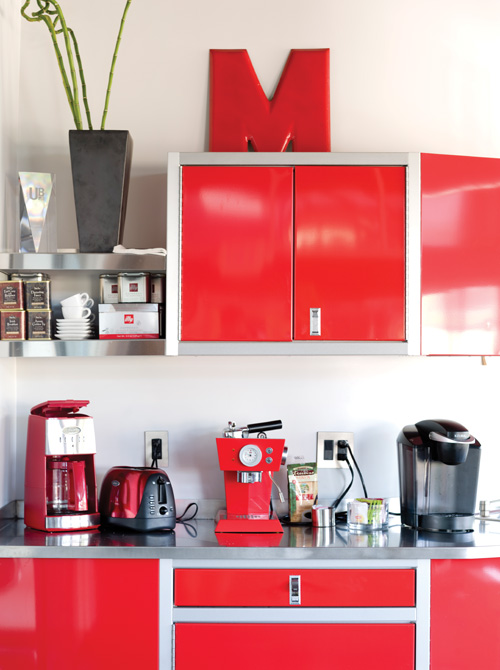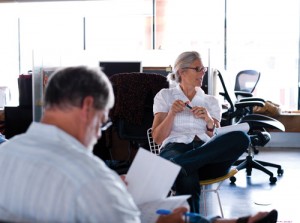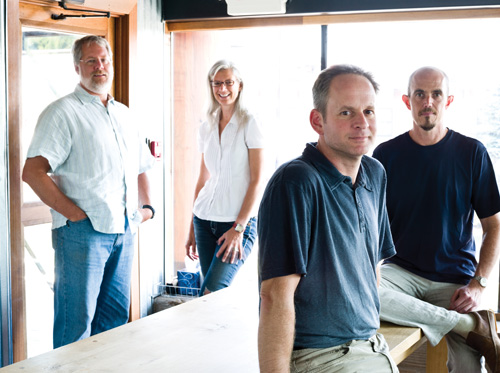Four advertising pros escape the city and find national success in Newburyport at Mechanica. By Sarah H. Ditkoff. Photographs by Christopher Churchill.
Off the beaten path in Newburyport sits an unassuming white carriage house. Upstairs, where hay was once stored, skylights let natural light in, and hand-blown glass fixtures in a variety of colors dangle at different heights. Downstairs, an old horse stall has been transformed into a small kitchen; another one is now a bathroom. The white walls are polka-dotted with push pins, and the wood floors have been restored to a shine.
While you might think this to be the home of reclusive artist, you’d be wrong. This is where the magic happens-the focal point for the creative ideas that come from Newburyport-based advertising firm Mechanica.
The urge to break away from the norm is what helped to form this small yet influential advertising powerhouse. Three of Mechanica’s four founders had spent the previous 10 years working for Mullen, the large advertising firm based in Boston, but after all that time, Ted Nelson, Libby DeLana, and Jim Garaventi began to feel cramped creatively. So they left and invited Alfred Link from a firm in San Francisco to join them in building a new advertising firm, Mechanica.
Now in Mechanica’s main building near the Tannery, looking across to Plum Island through a glass wall on which is written “Transforming the Process of Innovation” in dry-erase marker, things are certainly different. “That’s the great thing about building your own company,” DeLana says with a smile. “You can build one you actually want to work at every day.”
Typically, a client approaches an ad firm, and then the firm takes the resources they have available under their roof to launch a campaign. But 10 years ago, the world of branding and marketing shifted. “Some of the most powerful brands have come out within the past 10 years,” Nelson explains. “Facebook or Starbucks or Virgin Airlines; these are all really compelling, powerful brands, and there’s no traditional marketing involved in them whatsoever. They are founded on strong ideas.” Nelson says that his favorite brand of this ilk is Starbucks and the company’s notion of “the third place.” “That is the place between work and home. That’s the core of their business,” he says.
 With companies like Starbucks dominating the branding world, the team at Mechanica knew the approach to marketing needed to change. Mechanica was born out of the idea of moving from a one-size-fits-all solution to a completely network-based approach. Traditional ad firms contain their solutions to clients’ needs to whatever can be resolved under their own roofs, using their own people. Mechanica approaches things by looking at the problem from all sides and creating a strategy. Then, instead of choosing from a small in-house pool of creative thought, they hire freelancers from around the country who are the best at bringing their strategies to life. The folks at Mechanica are the strategists but refer to themselves as mechanics. It’s the execution of the strategy that’s usually done elsewhere.
With companies like Starbucks dominating the branding world, the team at Mechanica knew the approach to marketing needed to change. Mechanica was born out of the idea of moving from a one-size-fits-all solution to a completely network-based approach. Traditional ad firms contain their solutions to clients’ needs to whatever can be resolved under their own roofs, using their own people. Mechanica approaches things by looking at the problem from all sides and creating a strategy. Then, instead of choosing from a small in-house pool of creative thought, they hire freelancers from around the country who are the best at bringing their strategies to life. The folks at Mechanica are the strategists but refer to themselves as mechanics. It’s the execution of the strategy that’s usually done elsewhere.
Link gave one example of how these creative networks function. “We had a company come that was based in the Midwest, and they needed to both create and launch a new brand. So at one point, if you looked across the work board, it was being coordinated and managed out of Newburyport, and the client was in Michigan,” he says. From there, businesses in Maine, Boston, San Francisco, New York, Boulder, and Chicago handled everything from their respective locations. Product and packaging design, media, marketing communications, events strategy, and all of the online planning were produced offsite from around the country. “This is just one example, but it all filters through this place, in Newburyport,” Link says.
Typically, Mechanica’s clients are either well-funded start-up companies or more established businesses frustrated with the creative limitations of their current business relationships, which is similar to why Nelson, DeLana, and Garaventi left Mullen. More established branding companies were being invited fewer and fewer times to become involved with these branding ideas, like Starbucks, and suddenly the agency model was broken. There was a tremendous desire to do things better, to take ideas and turn them into successful businesses and to not only make a brand appealing, but to bring it to life.
Currently, Mechanica is working with Saucony, the running shoe company that is part of Stride Rite. To engage a campaign for Saucony, Mechanica did two things: they found the core of the business, and they decided how they wanted to convey that business core to the consumer. “Running is one of those immersive things people are into. It’s not just a pair of shoes; it’s an entire belief system,” says Garaventi. With Mechanica’s help, Saucony was able to identify their core business idea: being a runner is not only going out and competing in a race, but it’s also the training that’s required to compete and succeed in a race. “Being a runner never stops. It’s how you associate yourself with the world. ‘What running is to you’ was the campaign,” Garaventi explains.
The team displays a poster as an example of how the campaign communicated with its audience. The phrase “We know” is followed by a blank space. On the blank space, in hand-written type is the phrase “runs end but being a runner never stops,” and then “because we run.” Saucony held a contest where runners wrote in to fill their own blank, telling Saucony what running meant to them. In a two-week period, they received 5,000 submissions. At an actual marathon, the same phrase, “We know… because we run,” was written on a six-foot-wide white board. Runners were invited to write what they knew about running-same idea, but a different medium of communication.
 In this way, say the principals of Mechanica, Saucony doesn’t come across as a large company talking down to a consumer; it’s the consumer talking to other consumers in their own voices. “And you do this across the board, with every client,” Link explains. “You think, ‘What are the ways we can do this differently?’ And then you do them.”
In this way, say the principals of Mechanica, Saucony doesn’t come across as a large company talking down to a consumer; it’s the consumer talking to other consumers in their own voices. “And you do this across the board, with every client,” Link explains. “You think, ‘What are the ways we can do this differently?’ And then you do them.”
Nelson says that by not looking internally, but externally for answers to his clients’ questions, there is more freedom of movement when tackling a problem. “To think that you and your company can master every aspect of every campaign is crazy,” he says. Hiring freelancers allows Mechanica to consistently work with the best people for the job at hand, whether they work in Malibu or Montana. “It’s the only way to succeed in this age,” Nelson says.
Working from Newburyport has brought about nothing but positive results for the Mechanica team. After they work with a client for a couple of weeks, everyone flies in for what Link calls a “really intense two-day work marathon” at an off-site location: the carriage house in which Mechanica was founded. Thinking creatively and generating new ideas under the influence of a new location can bring about more than one would think; with less noise and more space to breathe, high-power executives find they can focus more.
Working in that carriage house is something of a homecoming for the four founders of Mechanica, and they get to share that sensation with their clients. “Every other place I’ve worked, I’ve always felt a definite line between my business and my client’s business. Lines don’t exist here,” Garaventi says.
One might still think that being more than 40 minutes from a major city would be a drawback for an international ad firm, but it simply isn’t the case. According to the founders, clients often don’t really get it until they reach Newburyport themselves and walk into the Mechanica building. Right on the water, with two floors of glass, steel, and wood overlooking Plum Island, it’s hard not to relax. A fishing boat steams by. A salty breeze wafts through a conference call. It’s a setting like this, the founders explain, that allows them and their clients to actually work harder than they would in a big, imposing, city-centered company. If the stress gets to be a bit too much, they step out for a sandwich or a cup of chowder in a nearby family-owned restaurant, receiving a family-like welcome.
“A lot of times you work in a city and you live somewhere else,” Nelson says. “There are these lines that cut throughout your life. You’re one way in an office, and you leave the office, and you become another person when you go home. But there’s a transparency to the North Shore that allows this seamlessness of being. There’s nothing artificial here, and I think clients can acknowledge that.”
In many ways, Mechanica’s location is what helps blur the traditional advertising firm expectation. Even outside of a city, there are still creatively stimulating places to work. “I think it’s easier to talk about a new model being in Newburyport than to talk about a new model while being in New York,” Garaventi says. “If anything, I think being in Newburyport almost in a way proves that we, in fact, do have a different model.”
Every creative firm in the country promises clients something different, but Nelson speculates that they’re still “working with the same paint brushes on the same canvases.” Many of these firms aren’t ready to do things differently when their clients come calling with new ideas because they haven’t modified their infrastructure, as Mechanica has. Nelson says, “We’re different, and be careful what you wish for, because we work in an entirely different manner than you might be accustomed to.”
Founded: June 1, 2004.
Clients: NBC, Virgin, match.com, Ticket-master, Timberland, TV Guide.
Employees: 18-20 in the office, 5-15 employed freelance.
Principals: Libby DeLana, Founding Principal/ Creative, Micah Danohue, Principal/ Contact Strategy, Jim Garaventi, Founding Principal/ Creative, Alfred Link, Founding Principal/ Management, Ted Nelson, Founding Principal/CEO, Arabella Plum, Brand Director. Contact: 75 Water St., Newburyport, 978-499-7871, mechanicausa.com.


